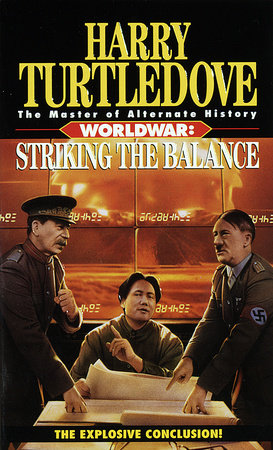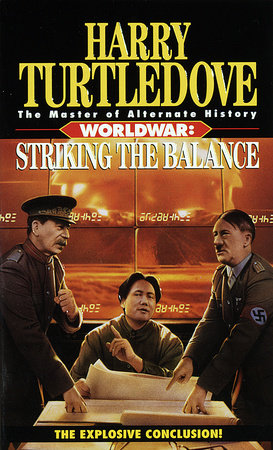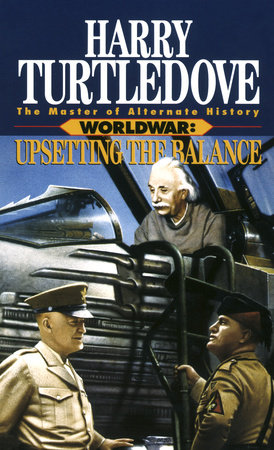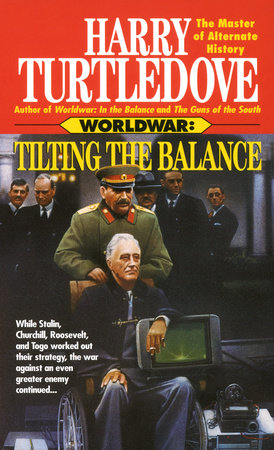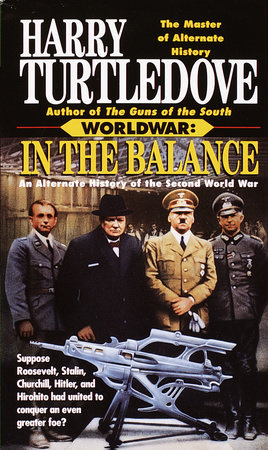Excerpt
Striking the Balance (Worldwar, Book Four)
In free fall, Atvar the fleetlord glided over to the hologram projector. He poked the stud at the base of the machine. The image that sprang into being above the projector was one the Race’s probe had sent back from Tosev 3 eight hundred local years earlier.
A Big Ugly warrior sat mounted on a beast. He wore leather boots, rusty chainmail, and a dented iron helmet; a thin coat woven from plant fibers and dyed blue with plant juices shielded his armor from the heat of the star the Race called Tosev. To Atvar, to any male of the Race, Tosev 3 was on the chilly side, but not to the natives.
A long, iron-pointed spear stood up from a boss on the contraption the warrior used to stay atop his animal. He carried a shield painted with a cross. On his belt hung a long, straight sword and a couple of knives.
All you could see of the Tosevite himself were his face and one hand. They were plenty to show he was almost as fuzzy as the beast he rode. Thick, wiry yellow fur covered his jaws and the area around his mouth; he had another stripe above each of his flat, immobile eyes. A thinner layer of hair grew on the back of the visible hand.
Atvar touched his own smooth, scaly skin. Just looking at all that fur made him wonder why the Big Uglies didn’t itch all the time. Leaving one eye turret aimed at the Tosevite warrior, he swung the other in the direction of Kirel, shiplord of the 127th Emperor Hetto. “This is the foe we thought we were opposing,” he said bitterly.
“Truth, Exalted Fleetlord,” Kirel said. His body paint was almost as colorful and complex as Atvar’s. Since he commanded the bannership of the conquest fleet, only the fleetlord out-ranked him.
Atvar stabbed at the projector control with his left index claw. The Big Ugly warrior vanished. In his place appeared a perfect three-dimensional image of the nuclear explosion that had destroyed the Tosevite city of Rome: Atvar recognized the background terrain. But it could as easily have been the bomb that vaporized Chicago or Breslau or Miami or the spearhead of the Race’s assault force south of Moscow.
“As opposed to the foe we thought we faced, this is what we are actually dealing with,” Atvar said.
“Truth,” Kirel repeated, and, as mournful commentary, added an emphatic cough.
Atvar let out a long, hissing sigh. Stability and predictability were two of the pillars on which the Race and its Empire had flourished for a hundred thousand years and expanded to cover three solar systems. On Tosev 3, nothing seemed predictable, nothing seemed stable. No wonder the Race was having such troubles here. The Big Uglies did not play by any of the rules its savants thought they knew.
With another hiss, the fleetlord poked at the control stud once more. Now the threatening cloud from the nuclear blast vanished. In a way, the image that replaced it was even more menacing. It was a satellite photograph of a base the Race had established in the region of the SSSR known to the locals as Siberia, a place whose frigid climate even the Big Uglies found appalling.
“The mutineers still persist in their rebellion against duly constituted authority,” Atvar said heavily. “Worse, the commandants of the two nearest bases have urged against committing their males to suppress the rebels, for fear they would go over to them instead.”
“This is truly alarming,” Kirel said with another emphatic cough. “If we choose males from a distant air base to bomb the mutineers out of existence, then, will it truly solve the problem?”
“I don’t know,” Atvar said. “But what I really don’t know, by the Emperor”—he cast down his eyes for a moment at the mention of his sovereign—“is how the mutiny could have happened in the first place. Subordination and integration into the greater scheme of the Race as a whole are drilled into our males from hatchlinghood. How could they have overthrown them?”
Now Kirel sighed. “Fighting on this world corrodes males’ moral fiber as badly as its ocean water corrodes equipment. We are not fighting the war that was planned before we set out from Home, and that by itself is plenty to disorient a good many males.”
“This is also truth,” Atvar admitted. “The leader of the mutineers—a lowly landcruiser driver. If you can image such a thing—is shown to have lost at least three different sets of crewmales: two, including those with whom he served at this base, to Tosevite action, and the third grouping arrested and disciplined as ginger tasters.”
“By his wild pronouncements, this Ussmak sounds like a ginger taster himself,” Kirel said.
“Threatening to call in the Soviets to his aid if we attack him, you mean?” Atvar said. “We ought to take him up on that; if he thinks they would help him out of sheer benevolence, the Tosevite herb truly has addled his wits. If it weren’t for the equipment he could pass on to the SSSR, I would say we should welcome him to go over to that set of Big Uglies.”
“Given the situation as it actually is, Exalted Fleetlord, what course shall we pursue?” Kirel’s interrogative cough sounded vaguely accusing—or maybe Atvar’s conscience was twisting his hearing diaphragms.
“I don’t know yet,” the fleetlord said unhappily. When in doubt, his first instinct—typical for a male—was to do nothing. Letting the situation come nearer to hatching so you could understand it more fully worked well on Home, and also on Rabotev 2 and Halless 1, the other inhabited worlds the Race controlled.
But waiting, against the Tosevites, often proved even worse than proceeding on incomplete knowledge. The Big Uglies did things. They didn’t fret about long-term consequences. Take atomic weapons—those helped them in the short run. If they devastated Tosev 3 in the process—well, so what?
Atvar couldn’t leave it at so what. The colonization fleet was on the way from Home. He couldn’t very well present it with a world he’d rendered uninhabitable in the process of overcoming the Big Uglies. Yet he couldn’t fail to respond, either, and so found himself in the unpleasant position of reacting to what the Tosevites did instead of making them react to him.
The mutineers had no nuclear weapons, and weren’t Big Uglies. He could have afforded to wait them out . . . If they hadn’t threatened to yield their base to the SSSR. With the Tosevites involved, you couldn’t just sit and watch. The Big Uglies were never content to let things simmer. They threw them in a microwave oven and brought them to a boil as fast as they could.
When Atvar didn’t say anything more, Kirel tried to prod him: “Exalted Fleetlord, you can’t be contemplating genuine negotiations with these rebellious—and revolting—males? Their demands are impossible: not just amnesty and transfer to a warmer climate—those would be bad enough by themselves—but also ending the struggle against the Tosevites so no more males die ‘uselessly,’ to use their word.”
“No, we cannot allow mutineers to dictate terms to us,” Atvar agreed. “That would be intolerable.” His mouth fell open in a bitter laugh. “Then again, by all reasonable standards, the situation over vast stretches of Tosev 3 is intolerable, and our forces seem to lack the ability to improve it to any substantial extent. What does this suggest to you, Shiplord?”
One possible answer was, a new fleetlord. The assembled shiplords of the conquest fleet had tried to remove Atvar once, after the SSSR detonated the first Tosevite fission bomb, and had narrowly failed. If they tried again, Kirel was the logical male to succeed Atvar. The fleetlord waited for his subordinate’s reply, not so much for what he said as for how he said it.
Slowly, Kirel answered, “Were the Tosevites factions of the Race opposed to the general will—not that the Race would generate such vicious factions, of course, but speaking for the sake of the hypothesis—their strength, unlike that of the mutineers, might come close to making negotiations with them mandatory.”
Atvar contemplated that. Kirel was, generally speaking, a conservative male, and had couched his suggestion conservatively by equating the Big Uglies with analogous groupings within the Race, an equation that in itself made Atvar’s scales itch. But the suggestion, however couched, was more radical than any Straha, the shiplord who’d led the effort to oust Atvar, had ever put forward before deserting and fleeing to the Big Uglies.
“Shiplord,” Atvar demanded sharply, “are you making the same proposal as the mutineers: that we discuss with the Tosevites ways of ending our campaign short of complete conquest?”
“Exalted Fleetlord, did you yourself not say our males seem incapable of effecting a complete conquest of Tosev 3?” Kirel answered, still with perfect subordination but not abandoning his own ideas, either. “If that be so, should we not either destroy the planet to make sure the Tosevites can never threaten us, or else—” He stopped; unlike Straha, he had a sense of when he was going too far for Atvar to tolerate.
“No,” the fleetlord said, “I refuse to concede that the commands of the Emperor cannot be carried out in full. We shall defend ourselves in the northern portion of the planet until its dreadful winter weather improves, then resume the offensive against the Big Uglies. Tosev 3 shall be ours.”
Kirel crouched into the Race’s pose of obedience. “It shall be done, Exalted Fleetlord.”
Again, the response was perfectly subordinate. Kirel did not ask how it should be done. The Race had brought only so much matériel from Home. It was of far higher quality than anything the Tosevites used, but there was only a limited quantity of it. Try as they would, the Race’s pilots and missile batteries and artillery had not managed to knock out the Big Uglies’ manufacturing capacity. The armaments they produced, though better than those they’d had when the Race first landed on Tosev 3, remained inferior . . . but they kept on making them.


